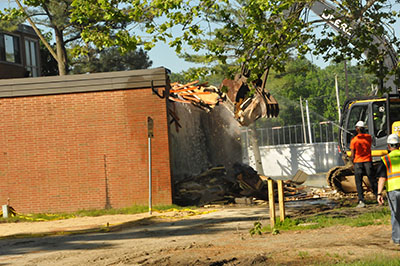
Former Laws RA helps demolish it
Delaware State University alumnus Norman Oliver, Class of 1985, worked as a residential assistant in Lydia P. Laws Residential Hall in the early 1980s.
Now he is helping to tear down the building.
Mr. Oliver is the owner of Rock Solid Contracting, and his company has joined forces with Wohlsen Construction in the work of demolishing Laws Hall to make way for a new 200,000-square-foot residential hall.
Mr. Oliver said his residential assistant job in a female dormitory was “one of the best jobs he ever had.” The former Student Government Association president earned a Bachelor of Social Work degree and later served as a DSU Board of Trustees member (2003-2008).
“I am very honored that my company is part of the work here, especially being a part of the Class of 1985 and having been an RA at Laws,” Mr. Oliver said at the media gathering on May 24 – about a half-hour before Rock Solid and Wohlsen began the demolition of the 56-year-old structure.
DSU and Wohlsen – a major construction company in the Mid-Atlantic Region and the general contractor for the project – have made a commitment to make diversity a standard in the contractors they hire for the $70 million project. J.D. Bartlett, DSU associate vice president of Capital Planning, said the University set a goal that 10% of the contract work on the project would go to minority contractors or contractors with significant minority stakeholders.
“Among the prime contractors that have been hired for this project, that goal has already been exceeded,” Mr. Bartlett said. He added there will be additional opportunities for minority contractors as sub-contracting to work on the project as needed.
“I commend DSU, Wohlsen and American Campus Communities (the lead developer and future operator of the new residential hall) for having the foresight to make minority contractors a part of this project,” Mr. Oliver said.
Because Laws Hall sits in what will become the outdoor courtyard area of the new residential hall, that construction will actually begin within the next couple of weeks before the demolition is completed.
The new five-story edifice will be the largest residential hall ever built on the DSU campus. In addition to having a 600-student residential capacity, it will also include a dining facility and an Academic Success Center – a technology-friendly study lab area.
The project will also lead to the demolition of Tubman Hall in May 2019; prior to that, students will continue to reside in that dormitory during the 2018-2019 school year. The new residential hall is projected to be completed by June 2019 and occupied by students in the fall semester 2019.
The project is the result of a public/private partnership between DSU and Collegiate Housing Foundation (CHF), which has allowed the University to move ahead with the new construction with a minimum of financial impact to the students and the institution. CHF is responsible for designing and building the residential hall, as well as for overseeing the operation and maintenance, which will be done by American Campus Communities (ACC).
After a 50-year lease of the grounds to CHF, the University will assume full ownership of the facility, saving millions of dollars in construction and operating costs while generating significant cash flow to pour back into the University’s strategic priorities.
The project is also eliminating more than $15 million in deferred maintenance for Laws and Tubman halls.
Collegiate Housing Foundation is a nonprofit tax-exempt organization established in 1996 for the sole purpose of assisting colleges and universities in acquiring or developing student housing facilities. CHF works with colleges and universities nationwide to give them the benefits of ownership of new, state-of-the-art student housing facilities without their having to assume responsibility for financing, building, or operating them.
CHF has financed over $2.1 billion for student housing facilities at 40 schools in 24 states.
American Campus Communities is the nation’s largest developer, owner and manager of high-quality student housing communities. ACC has partnered with CHF on a number of its projects.

